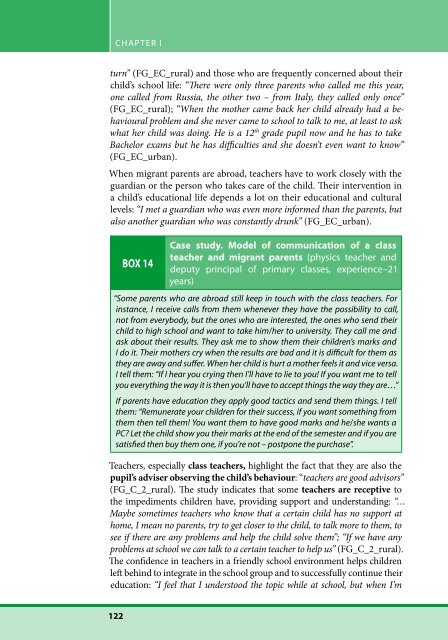specific needs of children and elderly left behind as a ... - IOM Moldova
specific needs of children and elderly left behind as a ... - IOM Moldova
specific needs of children and elderly left behind as a ... - IOM Moldova
Create successful ePaper yourself
Turn your PDF publications into a flip-book with our unique Google optimized e-Paper software.
CHAPTER I<br />
turn” (FG_EC_rural) <strong>and</strong> those who are frequently concerned about their<br />
child’s school life: “There were only three parents who called me this year,<br />
one called from Russia, the other two – from Italy, they called only once”<br />
(FG_EC_rural); “When the mother came back her child already had a behavioural<br />
problem <strong>and</strong> she never came to school to talk to me, at le<strong>as</strong>t to <strong>as</strong>k<br />
what her child w<strong>as</strong> doing. He is a 12 th grade pupil now <strong>and</strong> he h<strong>as</strong> to take<br />
Bachelor exams but he h<strong>as</strong> difficulties <strong>and</strong> she doesn’t even want to know”<br />
(FG_EC_urban).<br />
When migrant parents are abroad, teachers have to work closely with the<br />
guardian or the person who takes care <strong>of</strong> the child. Their intervention in<br />
a child’s educational life depends a lot on their educational <strong>and</strong> cultural<br />
levels: “I met a guardian who w<strong>as</strong> even more informed than the parents, but<br />
also another guardian who w<strong>as</strong> constantly drunk” (FG_EC_urban).<br />
BOX 14<br />
C<strong>as</strong>e study. Model <strong>of</strong> communication <strong>of</strong> a cl<strong>as</strong>s<br />
teacher <strong>and</strong> migrant parents (physics teacher <strong>and</strong><br />
deputy principal <strong>of</strong> primary cl<strong>as</strong>ses, experience–21<br />
years)<br />
“Some parents who are abroad still keep in touch with the cl<strong>as</strong>s teachers. For<br />
instance, I receive calls from them whenever they have the possibility to call,<br />
not from everybody, but the ones who are interested, the ones who send their<br />
child to high school <strong>and</strong> want to take him/her to university. They call me <strong>and</strong><br />
<strong>as</strong>k about their results. They <strong>as</strong>k me to show them their <strong>children</strong>’s marks <strong>and</strong><br />
I do it. Their mothers cry when the results are bad <strong>and</strong> it is difficult for them <strong>as</strong><br />
they are away <strong>and</strong> suffer. When her child is hurt a mother feels it <strong>and</strong> vice versa.<br />
I tell them: “If I hear you crying then I’ll have to lie to you! If you want me to tell<br />
you everything the way it is then you’ll have to accept things the way they are…”<br />
If parents have education they apply good tactics <strong>and</strong> send them things. I tell<br />
them: “Remunerate your <strong>children</strong> for their success, if you want something from<br />
them then tell them! You want them to have good marks <strong>and</strong> he/she wants a<br />
PC? Let the child show you their marks at the end <strong>of</strong> the semester <strong>and</strong> if you are<br />
satisfied then buy them one, if you’re not – postpone the purch<strong>as</strong>e”.<br />
Teachers, especially cl<strong>as</strong>s teachers, highlight the fact that they are also the<br />
pupil’s adviser observing the child’s behaviour: “teachers are good advisors”<br />
(FG_C_2_rural). The study indicates that some teachers are receptive to<br />
the impediments <strong>children</strong> have, providing support <strong>and</strong> underst<strong>and</strong>ing: “…<br />
Maybe sometimes teachers who know that a certain child h<strong>as</strong> no support at<br />
home, I mean no parents, try to get closer to the child, to talk more to them, to<br />
see if there are any problems <strong>and</strong> help the child solve them”; “If we have any<br />
problems at school we can talk to a certain teacher to help us” (FG_C_2_rural).<br />
The confidence in teachers in a friendly school environment helps <strong>children</strong><br />
<strong>left</strong> <strong>behind</strong> to integrate in the school group <strong>and</strong> to successfully continue their<br />
education: “I feel that I understood the topic while at school, but when I’m<br />
122

















